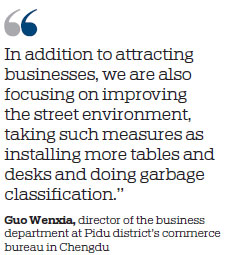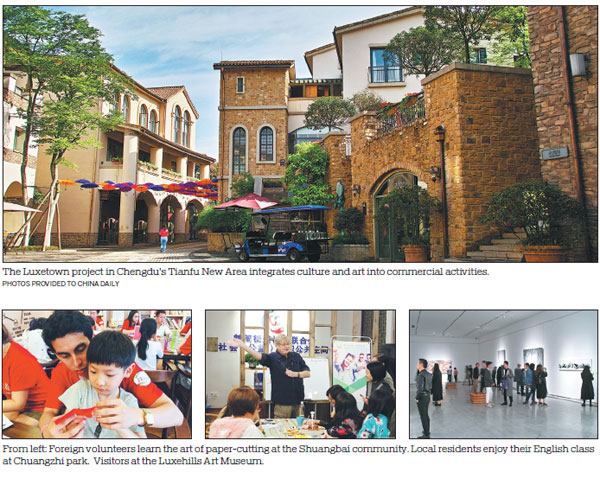Chengdu fuses old with new in community revitalization project
To meet residents' demands for consumption upgrade in the new era, Chengdu, capital of Sichuan province, is aiming to create world-class communities with convenient services, impressive cultural deposits and comprehensive supporting facilities, according to local officials.
In the city's Pidu district, the Shuangbai community is home to one of the demonstration areas, a block of streets which boast restaurants, taekwondo venues, cofee shops, clothing stores and a rich variety of recreational activities.
"It is my hope that residents can have door-to-door access to high-quality services in their communities," said Guo Wenxia, director of the business department at the district's commerce bureau.
"In addition to attracting businesses, we are also focusing on improving the street environment, taking such measures as installing more tables and desks and doing garbage classification.

"We aim to build a clean and open community where residents are able to fully enjoy their life in a relaxed environment," Guo said.
Chuangzhi park is a key area on the block, providing an innovative space for cultural exchanges in an open and inclusive manner. It is a public space for local residents and foreigners to communicate and learn from each other through various activities.
One of the most popular activities is the regular language exchange meetings held every night in the park, covering English, Japanese, Korean and Chinese.
"Life is becoming easier thanks to convenient services and good facilities. I feel satisfied with my life, especially when I go to practice my Japanese every Wednesday," said Liu Yujie, a local resident in the block street community.
Xiong Shan, director of the neighborhood committee at the Shuangbai community, said that to date, there have been more than 200 foreigners in the community thanks to the burgeoning development of the area's electronics and information industry.
"The Shuangbai community has built a number of long-term rented apartments that specifically cater to overseas talent. This has helped them quickly become accustomed to life in Chengdu. I know that a foreigner from South Korea has even opened a restaurant here," said Xiong.
Another example of such consumption upgrade is the Luxetown project in Chengdu's Tianfu New Area, which integrates culture and art into commercial activities.
Liao Lishen, executive director of Chengdu Luzhen Business Management Co Ltd, said that the 140,000-square-meter Luxetown project is designed as a mountain town with Tuscan architecture, the first of its kind in China.
It is home to a wide range of advanced facilities and services covering restaurants, bars, medical care, sports, art villages, hotels, art museums and conference centers, which provide residents and visitors with a flawless environment for commercial and cultural communication.
The Luxehills Art Museum, a highlight of the project, has held four large-scale art shows this year as well as one itinerant exhibition in Germany.
To further promote cultural communications, the museum regularly invites renowned domestic and international artists to teach art classes for teachers and students in the community and share their experiences in the sector, which helps to form a positive and nurturing artistic atmosphere, according to a local staff member.
In addition to the variety of available commercial activities, the town also combines its local culture with public welfare.
One example is the Lushi event held twice a month in the area, which has become a creative bazaar and cultural brand where daily necessities and artistic products are traded and exhibited.
Another is the public cultural class showing local households how to make traditional handicrafts techniques such as bamboo weaving and paper folding. Leveraging its geographic advantages, the town attracted the Tianfu International Fund Town to base its core operations in the area in 2016. As of this year, there are more than 220 institutes now present there with the fund management scale reaching 200 billion yuan ($29 billion).
"In the past, the area was a farmland and hillside covered with bushes. Now, the town is home to more than 70 businesses with the annual visitor flow surpassing 400,000. It has become one of the most desirable accommodation areas for foreigners.
"Focusing on the development of the town, the project will build art platforms for communication and cultural exchange with all kinds of commercial activities. By improving the natural environment, optimizing public facilities and creating a strong business atmosphere, we aim to construct a new community of world-class quality and consumption ability," said Liao.
The demonstration area in the Shuangbai community and the Luxetown are the stars of Chengdu's initiative to revitalize communities and their attached businesses. The city plans to integrate its cultural resources, tourism, businesses and agriculture into the development of modern communities through improving international consumption, modern consumption, urban renewal and rural communities.
To transform the city's traditional communities, Chengdu will make full use of its historical and cultural elements in the reconstruction of old towns, such as building special streets and gorgeous night-time river views. The city strives to integrate consumption in the city, with communities providing recreational services, cultural tourism and shopping experiences.
In addition, Chengdu is expected to inject modern and fashionable elements into its new communities, combining commercial complexes with services centers, creating integrated consumption opportunities by offering food, leisure and shopping. For international communities, Chengdu aims to build a batch of advanced global consumption spaces that include everything expatriate residents might desire, be it education, medical care, sports, bars or stores specializing in imported goods.
For rural communities, Chengdu will build more stores, farmers' markets and experience stores, together with administrative and business services. The city aims to add some 300 new such community business areas, 1,000 feature shops and 10,000 commercial chain stores by 2022.

(China Daily 12/22/2018 page10)














